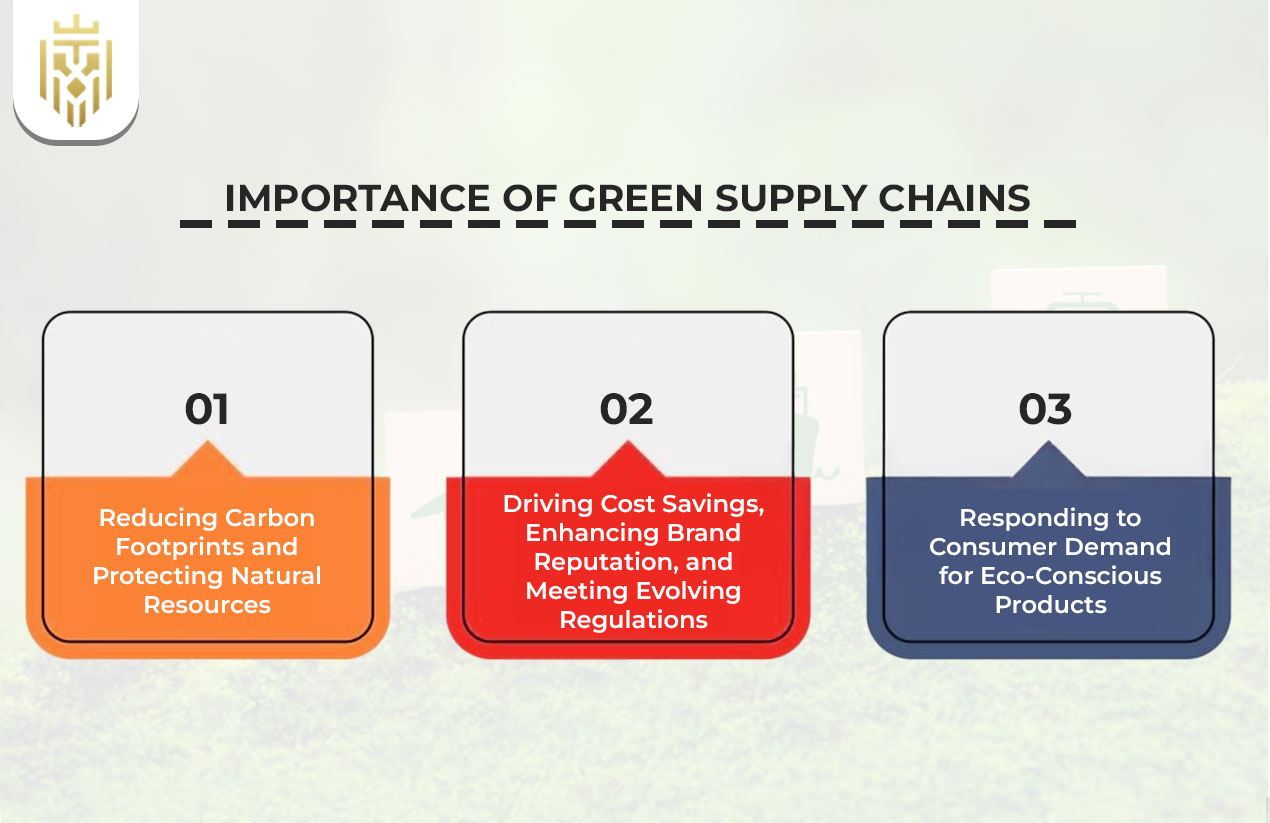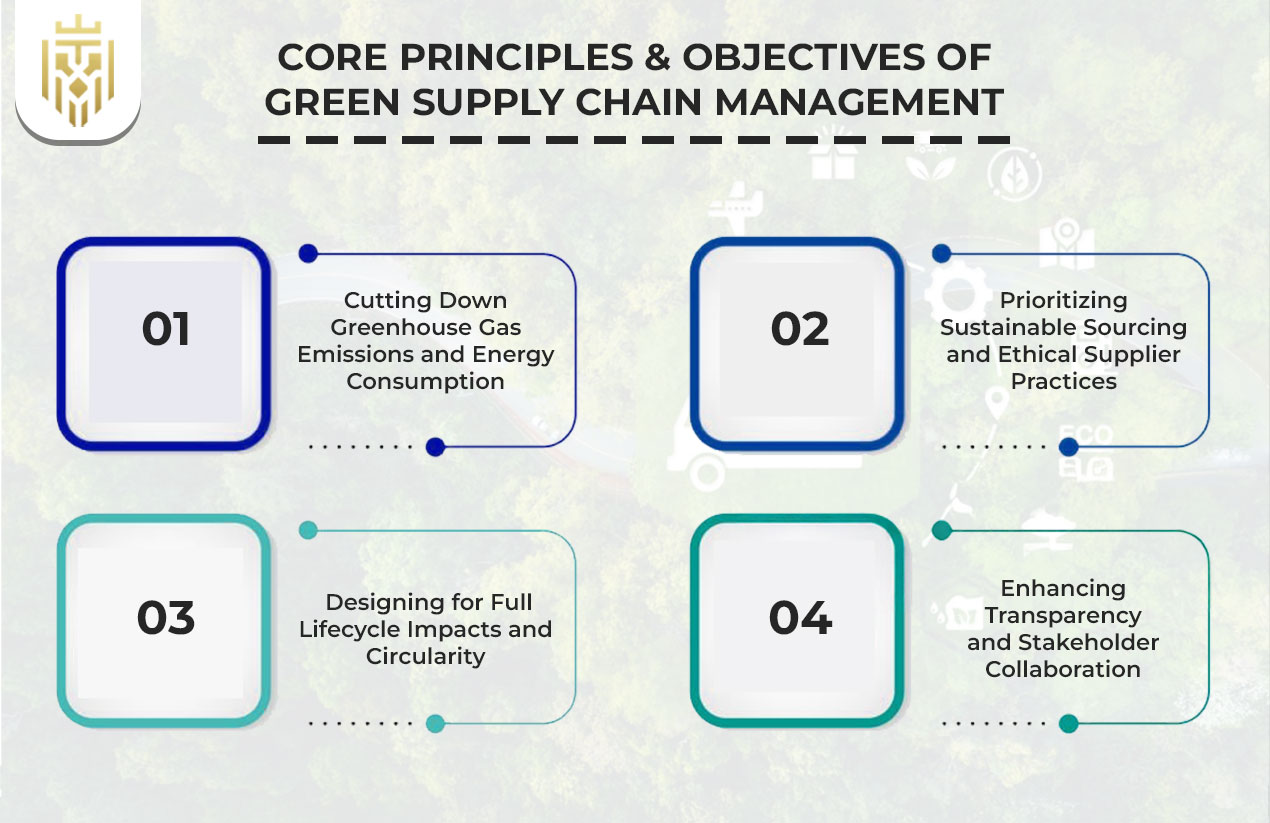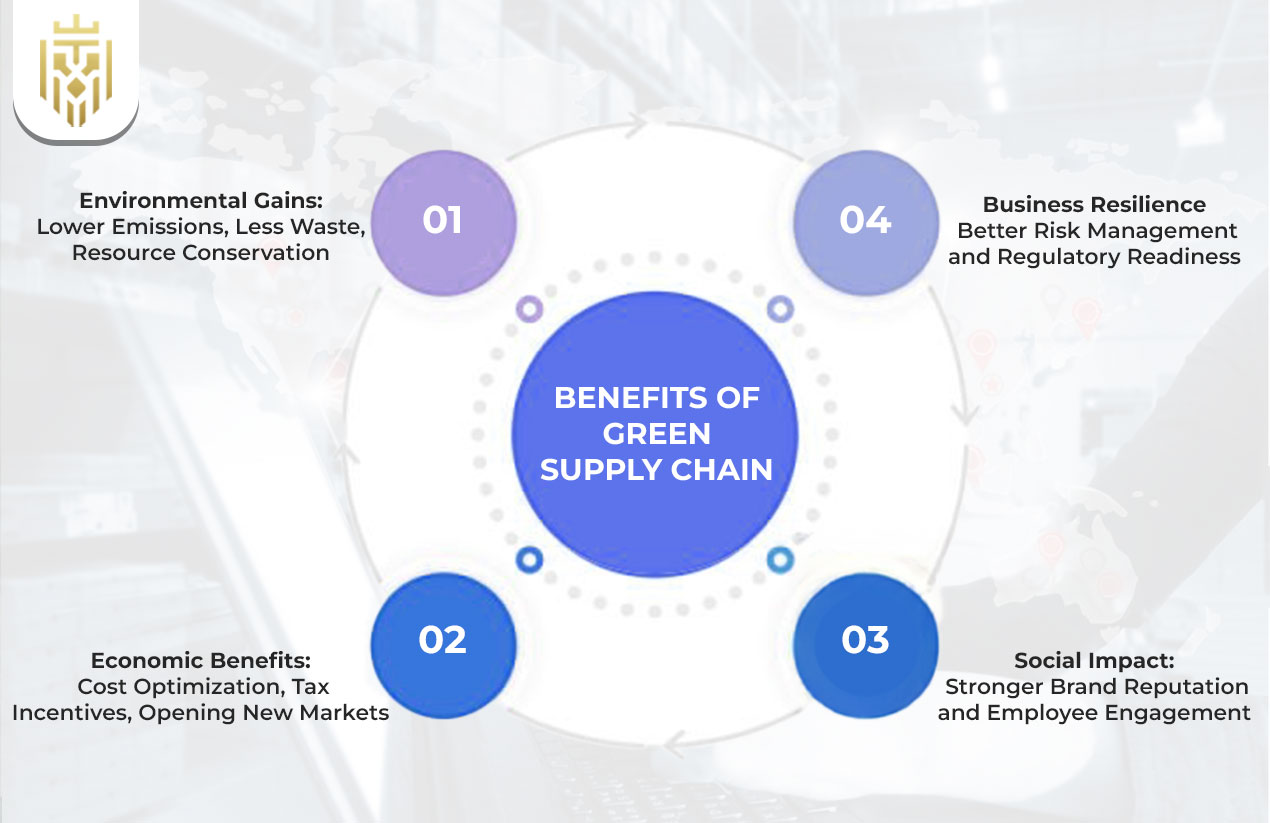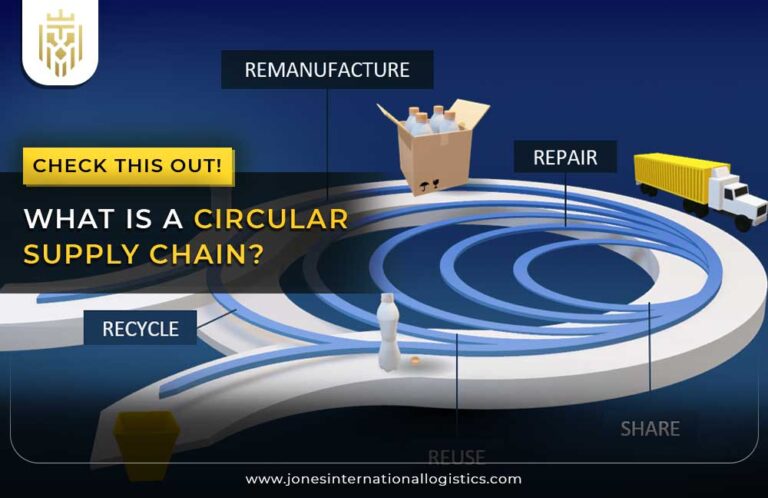What Is Green Supply Chain Management?
Green supply chain management has become a priority in many businesses in order to minimise environmental degradation. So exactly what is green supply chain management? It puts sustainable management principles into all the phases of the supply chain process, including sourcing and disposal. Green supply chains support sustainability and the use of resources.
How Important are Green Supply Chains?

The significance of the green supply chain is increasing all over the world. They assist firms to realise sustainable growth that is compatible with contemporary supply chain management standards. With the application of green supply principles, it is possible to decrease environmental risks, adhere to restrictions, and create a sensible, long-term-ready supply chain.
Reducing Carbon Footprints and Protecting Natural Resources
Green supply chain management emphasises reducing the carbon footprint and preserving resources. Firms embrace environment-friendly systems such as green SCM logistics and energy-friendly processes. The management practices will safeguard the earth, improve the supply chain, and favour a sustainable approach to global chain management.
Driving Cost Savings, Enhancing Brand Reputation, and Meeting Evolving Regulations
The green supply chain programs enable companies to minimise operating costs, comply with regulations, and build a brand image. Green supply chain management helps organisations to manage processes efficiently to minimise waste and energy. Such initiatives accrue to customer anticipations and shifting international practices of supply chain managers.
Responding to Consumer Demand for Eco-Conscious Products
The current consumers require products that are supported by the green supply chain initiative. Green SCM and sustainable supply chain management make businesses achieve this expectation. It guarantees the ethical means of product acquisition and manufacture, which supports brand credibility and chain responsibility.
Core Principles & Objectives of Green Supply Chain Management

The goals of green supply chain management are crucial to contemporary business. The principles of green supply chain management are the ones that aim at minimising environmental effects, ensuring ethical sourcing, and attaining efficiencies throughout the supply chain. Such management practices promote sustainability in the operations of the global chains’ management.
Cutting Down Greenhouse Gas Emissions and Energy Consumption
Green supply chain management is used to reduce greenhouse gases and energy consumption. Companies adopt green SCM so as to enhance their operational efficiency. The mentioned practices are significant to fulfil the goals of green supply chain management and enhance the resilience of the overall supply chain.
Prioritising Sustainable Sourcing and Ethical Supplier Practices
Green supply chain management focuses on ethical relations with the suppliers and ethical sourcing. The companies enable sustainability throughout the supply network by implementing green SCM and strict management. Such actions can be referred to as aligned with the green supply chain management goals and can promote global moral chain management.
Designing for Full Lifecycle Impacts and Circularity
Businesses develop products keeping in view the lifecycle impacts through green supply chain management. Green SCM advances circular economy schemes whereby wastages are minimised and reuse is propagated. The green supply chains and supply chain management objectives are fulfilled through these sustainable management practices that make their products live longer.
Enhancing Transparency and Stakeholder Collaboration
Green supply chain management requires transparency. By engaging the stakeholders and reporting on sustainability initiatives, companies under green SCM establish the trust of stakeholders. These management guidelines enhance the integrity of the supply chain and the rising demands for accountability of green supply and ethical chain theatre.
Key Practices in Green Supply Chain Management
Effective green supply chain management requires some practices in its management, which should be applied in the operations. Incorporating green SCM into the areas of procurement, production, and logistics allows the business to boost its supply chain management. Such initiatives contribute to sustainability, comply with the principles of green supply chain management, and encourage environmental friendliness.
Supplier Engagement & Green Procurement
Green supply chain management requires proper supplier relationships. The green SCM ensures that companies are concerned with buying matters in a green way. Such management practices will make the supply chain ethical and less offensive to the environment and meet the objective of green sourcing in the supply chain management of chain management worldwide.
Working with Responsible Suppliers and Verifying Sustainability Credentials
Green supply chain initiatives rely on the smart selection of suppliers. Checking sustainability credentials, companies maintain the green SCM standards and practices at ethical management. These will play a key role in achieving the objectives of supply chain management and in enhancing the credibility of the entire green supply chain.
Eco-Conscious Product Design & Packaging
Green supply chain management promotes product design that is environmentally friendly. Businesses are less harmful to the environment through green SCM and sustainable packaging. The management practices fit the contemporary expectations of the supply chain and facilitate to a great extent the attainment of the goals of green supply chain management in different parts of the world.
Choosing Recyclable Materials, Reducing Waste, and Designing for Reuse
Green supply chain management involves businesses utilising recyclable materials and avoiding wastage. Green SCM relies on designing for reusability and thus increasing sustainability. These managerial practices contribute to global supply chain management activities even though they fulfil the purpose of green supply chain management and responsible chain management.
Clean & Efficient Production Processes
Efficient production is the main focus of green supply chain management. The concept that companies are adopting is the green SCM, where energy is renewable and pollution is limited. These green management practices are useful to sustain global supply chains and assist corporations in attaining the green supply chain management goals along the various phases of the supply chain management.
Embracing Lean Manufacturing, Renewable Energy, and Pollution Control
Green supply chain programs are based on lean manufacturing and renewable energy consumption. Organisations manage the process and gain control over pollution through green SCM. These management practices increase efficiency in operation, enhance supply chain management, and help in creating a genuine sustainable green supply chain.
Green Warehousing & Transportation
The green supply chain management involves the optimisation of warehouses and transport. Use of green SCM enables companies to cut down on fuel usage and emissions. These management practices enhance operational efficiency and move towards the purpose of green supply chain management, thus generating a responsible, eco-friendly supply chain network across the globe.
Optimising Logistics Routes, Fuel-Efficient Fleet Choices, and Eco-Packaging
Green supply chain management depends on efficient logistics. Business incorporates green SCM with eco-packaging, optimised routes, and use of fuel-efficient vehicles. Such management practices minimise the effect on the environment and promote sustainable management of the supply chain, which are the prime goals of management of the green supply chain across the globe.
Reverse Logistics & Waste Recovery
Green supply chain management combines reverse logistics and waste recovery in order to facilitate sustainability. The green SCM promotes product redemption, recycling, and good disposal. These management practices augment circularity and abate wastage, which assists businesses in the achievement of the green supply chain and supply chain management targets successfully.
Enabling Returns, Recycling, Refurbishment, and Responsible Disposal
Green supply chain management encourages returns, recycling, refurbishment, and disposal responsibility. These managerial behaviours lower waste, feed circularity, and fortify the green supply chain. This kind of action is in line with the global goals of supply chain management and has proven to be a strategy of green SCM adoption.
Benefits of Going Green with Your Supply Chain

Green supply chain management has numerous benefits for the contemporary business. A green supply chain enhances efficiency and has a non-hazardous effect on the environment and brand image. Such endeavours follow the universally expected supply chain management goals as they meet the green supply chain management goals in industries.
Environmental Gains: Lower Emissions, Less Waste, Resource Conservation
The green supply chain method decreases emissions and waste and conserves resources. By application of green SCM and eco-friendly management practices, companies improve the sustainability of the supply chain. Such initiatives show that green supply chain management has substantial environmental value and also supports accountable chain management in global economies.
Economic Benefits: Cost Optimisation, Tax Incentives, Opening New Markets
Green supply chain management creates economic value by reducing costs, incentives, and market access. Companies save on waste and energy costs with green SCM and optimised management practices. A green supply chain enhances competitiveness and hence helps to achieve wider objectives of supply chain management and sustainable chain management.
Social Impact: Stronger Brand Reputation and Employee Engagement
Constructing a green supply chain enhances the reputation of the brand and product, as well as employees. With green supply chain management, businesses can embrace global expectations in terms of involving the ethical approach of management. Green SCM not only improves the supply chain but also provides a positive social effect and responsible chain management.
Business Resilience: Better Risk Management and Regulatory Readiness
Green supply chain management contributes to the resilience of business, thus increasing risk management and regulatory compliance. Sustainable management and green SCM protect operations, fulfil the changing regulations, and future-proof the supply chain of businesses. Such measures are aligned with the goals of green supply chain management in an effective way.
Green Chain Challenges & How to Overcome Them

Although green supply chain management is advantageous, it has limitations. Leadership, investment, and talented teams are needed to develop an effective green supply chain. Through commendable management methodologies, businesses can disregard obstacles as they boost supply chain management and achieve the objectives of green supply chain management.
Gaining Leadership Buy-In and Shifting Company Culture
The success of green supply chain management occurs with the support of leaders. Building a green supply chain requires an organisation to promote cultural change and green SCM leadership. Sound management strategies promote sustainability thinking that is beneficial to supply chain management and also chain management in general.
Making Upfront Investments with Long-Term Returns
Green supply chain management is usually necessitated by initial investments. But by having green SCM and other eco-friendly managerial practices, ultimate returns are made in the form of savings and efficiency. A responsible green supply chain adds sustainability to supply chain management while actualising the goals of green supply chain management worldwide.
Navigating Knowledge Gaps and Training Needs
To develop a green supply chain, the gaps to fill in evaluating and accumulating knowledge are essential. Businesses should offer employee training in green SCM practices. These measures enhance green SCM, facilitating supply chain management levels as well as promoting global chain management to the tune of the green supply preferences.
Coordinating Complex Partner Networks Across Regions
Green supply chain management cannot be successful without managing its global relationships. The green supply chain relies on the coordinated management practice among regions. In this way, by building cooperation and implementing green SCM, a business improves its supply chain management performance and achieves the goals of green supply chain management.
A Practical Roadmap to Go Green

The transition to green supply chain management is undergirded by a structured plan. Firms should evaluate existing operations and apply specific management to develop a green supply chain. Conformance to green SCM leads to better supply chain management, as well as fulfilling the provisions of green supply and chain management.
Conduct a Sustainability Audit to Identify High-Impact Areas
A sustainability audit is the initial step of green supply chain management. This is useful in identifying high-impact sites in the supply chain. Using green SCM and good practices in management, companies are able to enhance their supply chain, which is green, and take concerted efforts in establishing good global chain management.
Set SMART Goals – (e.g., Carbon Targets, Energy Use, Recycling Rates)
Green supply chain management achievements embrace clear objectives. Green SCM is matched with measurable results by companies fixing SMART targets on carbon, energy, and waste. Such modes of management improve the management of supply chains and the goals of green supply chain management in the world.
Engage Suppliers and Explore Sustainable Partners
Green supply chain management is enhanced by supplier collaboration. To create a green supply chain, businesses should involve responsible partners. Companies enhance the supply chain through green SCM and matching management practices, thereby ensuring ethical sourcing and meeting the objectives of green supply and global chain management.
Redesign Processes and Products Through Lifecycle Thinking
Green supply chain management encourages the use of lifecycle product design. Companies implement green SCM through the redesign of processes and products using green concerns. These other green supply management practices will promote supply chain management and also coincide with the goals of green supply chain management in the rest of the world.
Monitor Progress and Iterate using Key Sustainability Metrics
No green supply chain can be managed without continuous improvement. Companies enhance their green chain of supply by monitoring measures of sustainability and improving business management processes. Use of green SCM improves the global supply chain management and makes it a significant improvement in the responsible green supply chain management.
Conclusion
Green supply chain management depends on dedication, teamwork, and ongoing optimisation. Green supply chain management leads to sustainable management in business, which is beneficial to both the environment and the business. The adoption of green SCM is beneficial in achieving global supply chain management and serves the purpose of green supply chain management.
FAQs
1) What is green supply chain management?
Green supply chain management is the implementation of environmental activities within the supply chain, which aims at cutting down on waste, emissions, and utilisation of resources to produce a more sustainable, environment-friendly, and responsible green supply chain.
2) What are the principles of green supply chain management?
The main principles of green supply chain management are minimising emissions, sustainable procurement, ethical supplier relationships, product designing based on its lifecycle concept, minimisation of waste, and open management in favour of a green and responsible, efficient, and environment-friendly supply chain.
3) How to transform your supply chains into green supply chains?
Businesses should establish green supply chain management, put in place environmentally friendly management practices, have sustainable partners, redevelop products, reduce waste, and ensure transparency and circularity to transform the supply chains into green supply chains.
4) What is a green supply chain network?
A green supply chain network is a network of suppliers, manufacturers, and distributors that applies green supply chain management principles in an attempt to provide sustainable operations, resource efficiency, low environmental impact, and accountable supply chain collaboration across the entire distribution network.















